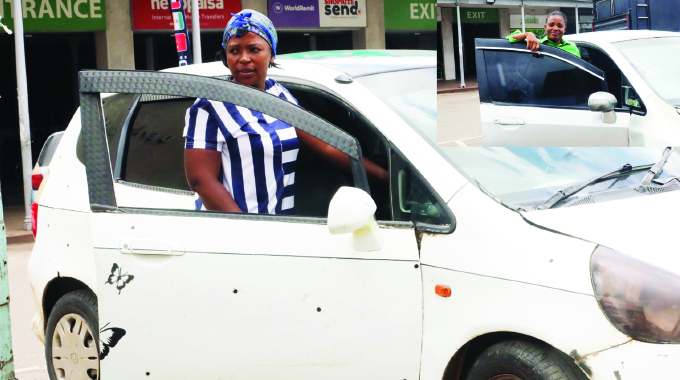MUSHIKASHIKA MAKEOVER – WOMEN DRIVERS SHIFT GEARS
Bulawayo’s public transport system, known for its intensity, is attracting a new breed of drivers – women.
They are taking on the mushikashika sector in their Honda Fit vehicles, demonstrating their strength and adaptability in a demanding environment.
Like their male counterparts, these women are constantly looking over their shoulders, wary of the police, as pirate taxi operators always are.
It’s a tough industry, demanding long hours, dealing with unpredictable passengers, and meeting daily targets, among a host of other challenges.
But these obstacles don’t deter them. These women have carved out a niche for themselves in a traditionally male-dominated profession.
They are not just driving taxis; they are driving a cultural shift, adding a much-needed vibrancy and diversity to the streets.
With a potent mix of determination, resilience, and a desire for independence, these women are not only earning a living, they’re inspiring others to follow in their tyre tracks.
For instance, one woman, Mai maTwins, who plies the City-Matopos Road route and recently joined the ranks of mushikashika drivers.
“I wanted to provide for my family while also being present for my kids.
“Driving gives me the freedom to balance both,” she said.
Mai maTwins’ story is just one among many, each unique and filled with its challenges and triumphs.
She said the response from the community has been overwhelmingly positive.
“Some passengers are beginning to appreciate the added warmth and connection that female drivers bring to the experience.
“They say there is something comforting about being driven by a woman and feeling safe, and it’s nice to chat with someone who understands the challenges we all face,” she said.
Although some share warm sentiments, others are yet to adapt to being driven by women.
“Some are warming up to the phenomenon; others, well, it’s a different story,” said Mai maTwins.
She said she got into the industry because of the low wages she was earning, and after the death of her husband, she had to step up and assume both the role of father and mother.
“It is better than standing on street corners selling my body like what other women would do.
“There are no jobs and we just pray one day the sector will be formalised and liberalised,” said Mai maTwins.
Another female driver, who preferred the name Mai Ali, said safety has been a significant motivation for many female drivers entering this field.
“With rising concerns about personal safety on public transport, having female drivers offers a sense of security for many passengers.
“We are not just transporting people but are creating a safe space, one ride at a time,” she said.
However, the journey hasn’t been without its bumps.
Many female drivers face scepticism and prejudice while carving their place in a traditionally male-dominated industry.
“Every day is a chance to prove that women can do anything,” said another woman mushikashika driver who preferred anonymity.
“We are here to stay, and we are here to drive change.”
She said as this new wave gains momentum, it is not just about transportation but empowerment and equal representation.
The female mushikashika drivers are becoming role models, showing younger generations that they can pursue their dreams, regardless of societal expectations.
“So, the next time you hail a taxi, consider the story behind the wheel.
“With every ride, you are not just reaching your destination, you are supporting a movement that celebrates women, diversity, and the spirit of resilience,” said another driver popularly known as Madzimai. *_-Herald_*




